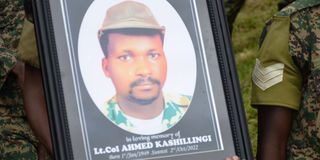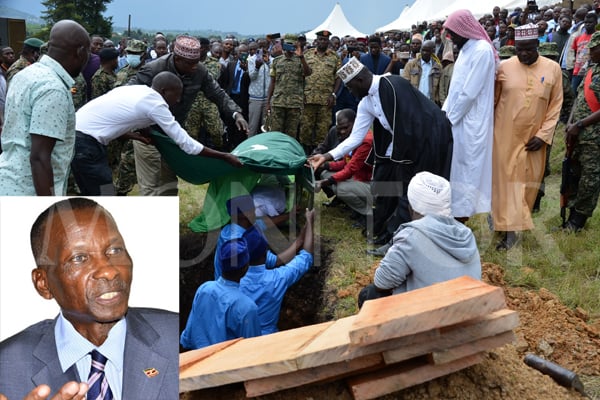Prime
Kashilingi won wars, died a prisoner of conscience

Lt Col Ahmed Kashilingi's Portrait carried by a soldier at his burial on October 3. PHOTO BY PEREZ RUMANZI
What you need to know:
Gone. One of the heroes of the five-year Luweero bush war that brought the current government to power, Lt Col (rtd) Ahmed Kashilingi passed on at 82 years on November
Men in military camouflage uniform stood side by side, three on each side of an earth dug grave, near an unfinished house, with people-packed tents in a compound. The sergeants held AK-47 guns.
A baritone cut through the silence: “Up! Down!” and more such military commands went on.
Despite the circumstances, I was curious at whose voice that was. From the two diamond shapes below the coat of arms on his uniform, he was a colonel. Thereafter, a flute was played as if to emphasise the previous commands. Other men in uniform carried a container with a shrouded body to the graveside. Three men stood in the grave to receive the shrouded remains and lower them.
People involved in these activities looked as serious as soldiers at war.
Indeed, they were carrying the body of a soldier who served all the governments that were and are, but simply left as a senior officer. Lt Col Ahmed Kashilingi, RO 00040 of the Uganda People’s Defence Forces.
To many, he was a patriotic and diligent fighter, professional army officer, an anticorruption crusader, a dedicated father, devout Muslim, law abiding citizen who was development-oriented. He founded schools, constructed roads for the community and initiated several other projects.
Zealous commander
Many people who treasured Kashilingi’s zeal are retired and serving Generals. Those he commanded alongside have either become president, great army administrators or movers of the country’s economy.
Part of President Museveni’s eulogy published by several online newspapers after Kashilingi’s burial read, “I divided the force into two groups: 700 all armed fighters, to proceed under Gen Saleh (Caleb Akandwanaho) by secret night marches, and attack Kabamba. The remaining 800, only 300 of them armed, to remain with me, directly commanded by Kashilingi.”
He further reveals how Kashilingi repulsed a government attack on December 28, 1984 at Kagembe in Luwero, a battle Museveni witnessed.
“Kashilingi, therefore, made his contribution to our struggle and we salute him… May his soul rest in eternal peace,” the eulogy read further.
Multiple times in his book, sowing the Mustard Seed, President Museveni mentions the name of Kashilingi and his bravolics during the bush war struggle from 1982 to 1986 that led to establishment of the NRM government.
How he joined the army
In 1967, Kashilingi joined the army in Mbarara as an accidental/ incidental recruit.
“He was refused entry into the army because of his height, but because he wanted it badly, he jumped on a truck that was taking recruits. The recruits were dropped off eight miles away to run back to the barracks. He was the first to arrive at the centre, and this boy who had not been selected was the first to be taken in,” his elder brother Dr Gregory Tumweheire recollected.
In 1969, Kashilingi trained with Moses Ali for a signal course. His other course mates included Dusman Sabuni, Alfred Aswa and Juma Oris. A year later, he went to England for a course in military records management. When Amin took over, Kashilingi joined his government. In 1972, Kashilingi was earmarked for training as the first Uganda army commando in Benghazi, Libya.
After a year, he was sent for another para-commando course in Baghdad, Iraq. After that he headed the first commando unit of the Amin government. However, in 1976 he was arrested and all his comrades killed in jail following the Isreali invasion of Entebbe Airport who had come to rescue their nationals.

Some of teh Children of the late Ahmed Kashilingi who attended the burial. PHOTO BY PEREZ RUMANZI
The escape and battles
Kashilingi is said to have used a fork to dig a hole in the military detention and escaped. He was however recaptured and detained again. His wife Zainabu Mbabazi reached out to Mustapha Idrisa who was Amin’s vice president and a comrade who released Kashilingi.
When Amin was ousted, Kashilingi fought alongside exiles especially those aligned to the Democratic Party. He joined the Uganda Freedom Movement under Dr Andrew Kayiira where he integrated with the People’s Redemption Army in 1984 and commanded some of the fiercest battles including one at the Katonga River and the second Kabamba attack.
He was also instrumental in recruiting fighters from Rukungiri District into the struggle. These include Gen Henry Tumukunde and his brother Col Tumukunde, Gen Jim Muhwezi, and Gen Aronda Nyakairima.
Retired into family
When NRM came to power, Kashilingi was appointed to head military records at Republic House. The house later got burnt and he went into exile in DR Congo but, was repatriated, arrested and spent more than eight years in prison of the government he diligently fought for. He was released and retired. He did not hold any office or attain a rank higher than Lieutenant Colonel. Maybe he found solace in his children.
“My father liked children, us, I believe even without anything, he is happy because we are many. He knew each one of us and our challenges, we are over 100,” Zubeda Kashilingi said.
His eldest son Hussein Kashilingi, is a lawyer of the NRM.
A Catholic by birth and nurturing, Kashilingi converted to Muslim in 1971 as a serving officer because he wanted to be accommodated in the army well, which at the time was dominated by Muslim commanders.
Patient and not materialistic
A close friend Rtd Maj Gen Steven Kashaka, described the deceased as one of the most patient people he had ever seen.
“The army is a very hard journey, that when you walk together, it creates serious friendship. We did many things (together), some official and some, informal. Where we disagreed it was just because of religion. What I learnt from him was that he never valued material possession, but he valued children so much that he got the many he wished for,” Gen Kashaka said.
Gen Kashaka however, like many other speakers at his burial showed discontent over the life of Kashilingi.
“In working for the government, or the people, you never see the reward. After all, the reward we were looking for in all this was peace, peace for the country. He lived a very adventurous life, had the art of presenting himself to be recognised by everyone around him, a commander in all senses, a great friend to his colleagues. I believe we have lost him before his time,” he said.
Zubeda reflected on the kind of life her father lived, regrettably as a “difficult life”.
“Afande has really lived a difficult life, like most men do, some recover, some never; I think he did not recover. But yet again, that’s life and it’s behind him now,” Zubeda said.
One of the key commanders of the NRA died of diabetes at Rubaga Hospital. He was buried in Kebisoni, Rukungiri on November 4.
Education
Born on January 1, 1949 in Nyamigongo village, northern ward Kabisoni Town Council Rukungiri district, Kashilingi attended Kebisoni Primary School, Rukungiri before joining, Kigezi College Butobere, Kabale for his secondary school education where he completed A-Level in 1967. In the same year, he joined the army at Mbarara.
In 1969, Kashilingi trained for a signal course. A year later, he pursued a course in military records management in England. In 1972, he was earmarked for training as the first Uganda army commando in Benghazi, Libya. A year later, he was sent for a para-commando course in Baghdad, Iraq.




